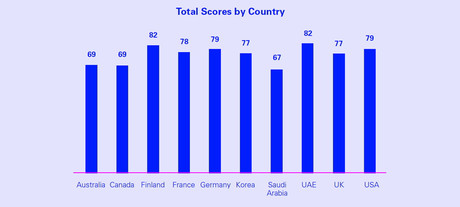Australia scores poorly in international index

Australia scores poorly in international communications index.
Highly regarded international communications expert Peter Clemons has released the first edition of the Quixoticity Index, a report that among other things ranks various countries according to the maturity of their critical communications systems.
“I founded Quixoticity back in 2012 with the ambitious goal of developing a new philosophical, analytical and prescriptive framework for explaining complex modern systems,” writes Clemons in the introduction to the Index, which was launched at the Comms Connect conference in Melbourne in late November.
“This first edition of the Quixoticity Index, dedicated to identifying and promoting best practice in the world of public safety and critical communications as we move towards a new era for humankind — the so-called 5G Era (until we find a better term) — is a first attempt to present the findings of studies I have been undertaking now for decades.”
Clemons notes that “TETRA and P25 will continue for many, many years in a large number of global markets, together with other lower-cost PMR technologies that deliver in a simple, cost-effective way exactly what they promise, better than any other solution currently available”, but that future clearly belongs to 5G.
“As it is being conceived and designed, 5G will very clearly be much, much more than just another generation of mobile communications. The consolidation, enhancement, convergence and constant evolution of a wide range of advanced technologies, some of which have been around for decades and some that have only appeared recently… will drive forward a new industrial revolution, whose full consequences we can only imagine today,” he writes in the report.

“This revolution will probably not even be complete by 2030, but its direction and probable destiny should be much clearer to us by then. In a physical world driven by greater digitalisation, cloudification and virtualisation of everything, security, privacy and trust in such complex systems will require all communications to be critical.”
Interestingly, Clemons says he believes the United Nations’ Sustainable Development Goals (SDGs) offer a template for the way forward.
“In Quixoticity’s model of a future society, mission-critical service levels, a full deployment of all three corners of the 5G triangle and adherence to the SDGs all combine to move us towards a better world by 2030,” he writes.
“These three components are at the very heart of the Quixoticity Index: core requirements to be adopted by the most progressive markets hoping to achieve the highest scores for social cohesion, national security, public safety and general well-being of digital citizens.”
Country rankings
Clemons is well placed to conduct such an analysis of the current state of critical communications worldwide, being a former director and board member of the TETRA + Critical Communications Association and former director of communications at Spanish TETRA manufacturer, Teltronic S.A.U.
At the Comms Connect Melbourne 2017 conference, Clemons organised and moderated an expert panel discussion on the steps that need to be taken by the critical communications industry/community to place its requirements at the core of future converged networks. He also was a leading participant in the ‘Back to the future — Digital Land Mobile Radio & Business Critical broadband’ workshop.
For the Quixoticity Index, Clemons looked at 10 different markets: Australia, Canada, Finland, France, Germany, South Korea, Saudi Arabia, the United Arab Emirates, the United Kingdom and the USA.
“Each country possesses a unique history and geography; differentiated legal, political, economic and financial systems, upheld by a particular set of institutions and agencies, shaping its unique identity,” writes Clemons.
The Index goes into detail about the state of play in each country and gives an overall score for each, broken down into 20 sectors such as governance, interoperability, infrastructure and disaster preparedness.
The graphic below shows the results, with Australia attaining a score of 69, putting it equal second-last along with Canada.

On Australia, Clemons writes, “Federal Government lack of action regarding spectrum, final broadband strategy and longer-term clarity regarding 5G remains a major issue, as does the country’s need to work harder on some of the UN SDGs. It is also struggling to deliver a nationwide broadband services delivery project that is behind schedule and over budget.”
The 52-page report should be downloaded (it’s free from the Quixoticity website) and read by everyone in the critical communications field. It gives a lot of food for thought and, in some cases, should generate some soul searching from those in positions of power around the world. And its emphasis on the societal need for and social benefit to be obtained from critical communications is a welcome antidote to the purely technical approach that is typical of this market.
“This first edition of Quixoticity Index is a work in progress; a first attempt to explain the critical communications world to a wider audience, start a debate and move us all — leaving no-one behind — towards a better, smarter, safer world in 2030,” concludes Clemons.
One week on: AT&T's nationwide network outage
Any Australians who found themselves in the United States last week may have experienced a sense...
How MCX continued to evolve in 2023
The year 2023 was one of continuous evolution of the critical communications ecosystem towards...
St John WA selects Omnitronics for ambulance dispatch
St John WA has commenced implementation of the omnicore Enterprise Dispatch system, with the...






